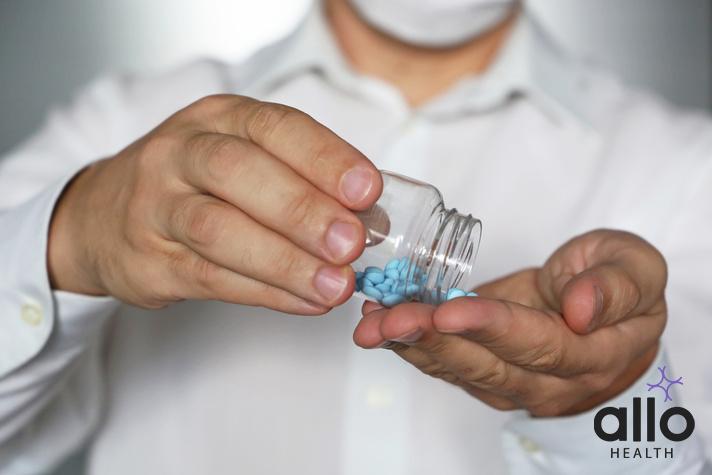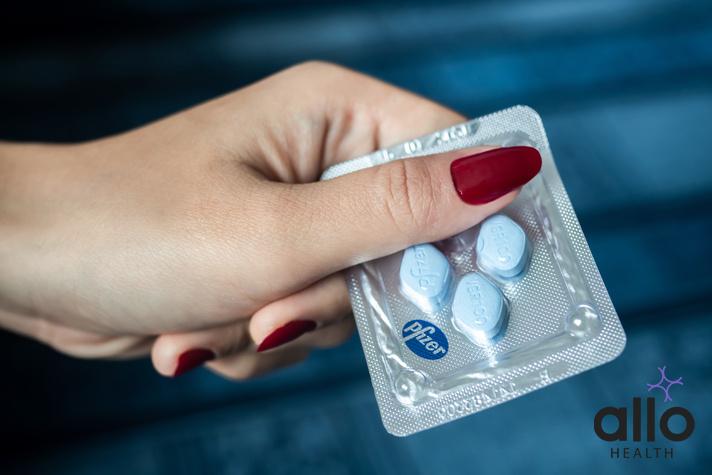5 Types of Pills to Make You Ejaculate Quicker

Allo Health is dedicated to personalized well-being, offering support and trusted information tailored to individual health goals. The platform emphasizes human-generated content, led by a distinguished medical team of experts, including physicians and sexual health specialists. Their commitment to credibility involves rigorous fact-checking, authoritative research, and continuous updates to ensure accurate, up-to-date information. Allo Health's unique approach goes beyond conventional platforms, providing expert-led insights and a continuous commitment to excellence, with user feedback playing a crucial role in shaping the platform's authoritative voice.

Dr.Sushma.V completed MBBS degree from BGS GIMS,bangalore
Why This Was Upated?
Our experts continually monitor the health and wellness space, and we update our articles when new information became available.
Updated on 31 May, 2024
- Article was updated as part of our commitment to diversity, equity, and inclusion.

"The following blog article may discuss medical treatments and interventions. However, it is important to note that the information provided is for general educational purposes only and should not be considered as a substitute for professional medical advice, diagnosis, or treatment. Always seek the guidance of a qualified healthcare professional for personalized medical advice.
Book consultation
Medical treatments are complex and should be tailored to individual circumstances. The information presented in this blog may not be applicable to everyone, as each person's medical condition, history, and needs are unique. Only a qualified healthcare professional can evaluate your specific medical situation, consider relevant factors, and provide appropriate recommendations for diagnosis, treatment options, and monitoring.
It is crucial to note that self-diagnosis, self-medication, or relying solely on the information provided in this blog for treatment decisions can have serious health consequences. "
The search for a satisfying sexual life often leads many to explore various solutions, including pills designed to help you ejaculate quicker. These pills, encompassing a range of medical and alternative treatments, promise to improve your sexual encounters, but it’s important to approach them with knowledge and caution. In this article, we’ll dive into the pills to make you ejaculate quicker, examining their types, effectiveness and crucial considerations to help you make an informed decision.
What is Ejaculation and How Does it Happens?
Ejaculation is the release of semen from the male reproductive tract. It’s a key component of male sexual function and fertility.
- Stimulation Phase:
- Begins with sexual arousal, stimulated by physical touch, erotic thoughts or sensory input.
- Increased blood flow to the penis leads to an erection, necessary for sexual intercourse.
- Ejaculatory Process:
- Nervous system plays a crucial role. Sexual stimulation triggers nerve signals from the spinal cord to the penis.
- These signals cause the muscles at the base of the penis to contract rhythmically, forcing semen through the urethra and out of the body.
- This process is often accompanied by a pleasurable sensation known as orgasm.
- Role of Hormones: Hormones like testosterone are crucial for the normal functioning of the ejaculatory process.
- Reflex Action: Ejaculation is primarily a reflex action controlled by the central nervous system. It involves both voluntary and involuntary muscle contractions.
- Variability: The volume of semen, force of ejaculation, and refractory time (time needed to ejaculate again) vary among individuals.
Understanding ejaculation is important to comprehending male sexual health and fertility. It’s a complex process involving hormonal, neurological and vascular components working in harmony.
What is Delayed Ejaculation?
Delayed ejaculation (DE) is a sexual dysfunction characterized by a marked delay or inability to achieve ejaculation during sexual activity. This condition can significantly impact sexual satisfaction for both the individual and their partner. Various factors contribute to delayed ejaculation, such as:
- Medical History and Health Conditions: Chronic health concerns, including diabetes, high blood pressure, and neurological disorders, can contribute to DE. It’s important to review one’s medical history with a healthcare provider.
- Psychological Concerns: Psychological factors, such as performance anxiety, stress and other mental health concerns, can play a significant role in DE. These concerns might stem from past sexual experiences or psychological trauma.
- Certain Medications and Drugs: Certain prescription drugs, including antidepressants (like selective serotonin reuptake inhibitors and tricyclic antidepressants), high blood pressure medications, and anti-anxiety medications, can lead to DE. Recreational drugs and excessive alcohol consumption can also be contributing factors.
- Sexual Experience and Sexual Performance: Men with less sexual experience or those facing challenges in sexual performance might experience DE. This could be linked to performance anxiety or unrealistic expectations about sexual encounters.
- Pelvic Floor Disorders: Problems with the muscles of the pelvic floor can affect ejaculatory control and lead to delayed ejaculation.
- Hormonal Imbalances: Hormonal concerns, particularly those affecting testosterone levels, can impact sexual function, including ejaculation.
- Neurological Conditions: Conditions affecting the nervous system, like multiple sclerosis or spinal cord injuries, can interfere with the signals required for ejaculation.
- Relationship and Intimacy Concerns: Emotional disconnect or concerns in a relationship can sometimes manifest as DE. This may include lack of sexual intimacy or unresolved conflicts between partners.
- Age-Related Factors: As men age, changes in ejaculation patterns are common. This can include a natural delay in ejaculation.
It’s important for individuals experiencing DE to consult with healthcare providers, as this condition can be a symptom of underlying health concerns. Treatment approaches may involve addressing the physical condition, psychological counseling, adjusting medications or exploring alternative treatments for sexual dysfunction.
Pills to Make You Ejaculate Quicker
Understanding the best available pills to promote quicker ejaculation involves a comprehensive look at various prescription treatments, each addressing different aspects of sexual function. However, for individuals looking to decrease their refractory time (the period following ejaculation where sexual arousal and orgasm cannot occur), there are certain medications and supplements that might help.
1. Selective Serotonin Reuptake Inhibitors (SSRIs):
- Primarily used for treating depression, SSRIs have shown efficacy in reducing the refractory time, thereby allowing quicker ejaculation.
- Medications like sertraline and paroxetine.
- They may come with side effects like reduced libido or delayed ejaculation.
2. Phosphodiesterase-5 (PDE5) Inhibitors:

- Commonly used for erectile dysfunction, these pills can also influence ejaculation patterns.
- Sildenafil (Viagra) and tadalafil (Cialis).
- They work by increasing blood flow to the penis, potentially leading to quicker readiness for subsequent sexual intercourse.
3. Tricyclic Antidepressants:
- Similar to SSRIs, TCAs increase neurotransmitter levels in the brain but affect norepinephrine and dopamine as well.
- Medications such as clomipramine.
- Potential adverse effects include drowsiness and dry mouth. They are less commonly used due to more significant side effects compared to SSRIs.
4. Testosterone Supplements:
- In cases where low testosterone levels are a contributing factor, testosterone replacement therapy may help.
- It’s important to have testosterone levels checked by a healthcare provider before starting any supplementation.
5. Dopamine Agonists:
- These medications, such as certain antidepressants, can increase dopamine levels in the brain.
- Increased dopamine can sometimes reduce the refractory period.
6. Herbal Supplements:
- Some herbal supplements, like L-arginine, maca root or yohimbine, are claimed to enhance sexual performance.
- However, their effectiveness is not consistently supported by scientific evidence, and they may have side effects.
Note: The effectiveness and safety of these treatments can vary greatly between individuals. Some of these options might have side effects or interact with other medications. Always consult with a healthcare provider before starting any new medication or supplement for sexual health.
Other Methods to Make You Ejaculate Quicker

Delayed ejaculation (DE) can be a challenging condition, affecting sexual activity and satisfaction. While prescription treatments like PDE5 inhibitors and SSRIs are common, there are several non-pharmacological techniques to consider:
- Pelvic Floor Exercises: Strengthening the pelvic floor through Kegel exercises can enhance sexual performance and help in managing ejaculation patterns. Regular practice can lead to improved ejaculatory control.
- Behavioral Techniques:
- Pause-Squeeze Technique: This involves stimulation until the point of imminent ejaculation and then gently squeezing the penis to prevent ejaculation. It helps in training the body for better ejaculatory control.
- Start-Stop Method: Similar to the pause-squeeze technique, this involves stopping sexual stimulation before ejaculation and restarting after the urge subsides.
- Psychological Counseling: Addressing psychological factors like performance anxiety, stress, and relationship concerns can be crucial. Mental health counseling and sex therapy can provide strategies for managing anxiety and improving sexual encounters.
- Sexual Experience and Exploration: Increasing sexual experience and experimenting with different forms of sexual intimacy can help in understanding and improving ejaculation control.
- Mindfulness and Relaxation Techniques: Stress reduction through mindfulness, meditation or yoga can alleviate performance anxiety, thus impacting sexual performance positively.
- Lifestyle Changes:
- Reducing Alcohol Consumption: Excessive alcohol can negatively affect sexual performance.
- Avoiding Recreational Drugs: These can impair sexual function and delay ejaculation.
- Regular Exercise: Improving overall physical health can have a positive effect on sexual function.
- Communication with Partner: Open communication about sexual preferences and concerns can enhance sexual intimacy and improve sexual encounters.
- Medical Evaluation: Sometimes, delayed ejaculation is a symptom of underlying medical conditions. A comprehensive evaluation by a healthcare provider can identify and address these concerns.
Note: Remember, each individual’s experience with delayed ejaculation is unique, and what works for one person may not work for another. Consulting healthcare professionals is advisable for a personalized treatment approach.
Risks and Considerations
When considering pills for delayed ejaculation, it’s important to understand the potential risks and considerations. These include:
Potential Side Effects
- Selective Serotonin Reuptake Inhibitors (SSRIs): Common side effects include nausea, drowsiness and decreased libido.
- Tricyclic Antidepressants: These may cause dry mouth, blurred vision, and constipation.
- Phosphodiesterase-5 (PDE5) Inhibitors: Side effects can include headaches, flushing and dizziness.
- Monoamine Oxidase Inhibitors: These are less commonly used due to severe side effects and dietary restrictions.
Psychological Impact
- Medications like SSRIs can alter mood and mental health, potentially leading to increased anxiety or depression.
Impact on Sexual Performance
- While aimed at delaying ejaculation, these pills can sometimes lead to reduced sexual desire or difficulty in achieving orgasm.
Interactions with Other Medications
- Combining these pills with certain prescription drugs, over-the-counter medications or recreational drugs can lead to adverse effects.
Underlying Health Conditions
- Patients with heart conditions, blood pressure concerns or other health conditions need to be cautious as these medications can exacerbate such problems.
Dependency and Withdrawal
- Long-term use of these medications can lead to dependency and abrupt discontinuation can cause withdrawal symptoms.
Impact on Ejaculation Patterns
- In some cases, these medications can cause retrograde ejaculation or significantly alter ejaculation patterns.
Consultation with Healthcare Providers
- It’s crucial to discuss medical history, sexual history and current health conditions with a health care provider before starting any treatment.
Alternatives and Complementary Therapies
- Consider exploring alternative treatments such as pelvic floor exercises, behavioral treatment or sex therapy as adjuncts or alternatives to medication.
Personal and Partner Considerations
- The impact of these medications on sexual intimacy and partner satisfaction should be considered.
While pills for delayed ejaculation can be effective, they come with a range of risks and considerations. A thorough discussion with healthcare professionals is essential to determine the most appropriate and safe treatment approach.
Conclusion
Dealing with delayed ejaculation can be overwhelming. Pills that promise to help you ejaculate quicker can be a viable solution, but they come with their own set of risks and considerations. It’s essential to balance your desires for improved sexual performance with the importance of your overall health and well-being. Always consult with healthcare providers to find a safe and effective treatment approach. Remember, the journey towards better sexual health is not just about quick fixes, but about finding a sustainable and healthy way to enhance your sexual experiences.
Most Asked Questions
-
What exactly are pills to make you ejaculate quicker?
Pills to make you ejaculate quicker are medications prescribed by healthcare providers to help individuals who ejaculate late than they or their partners would like. These pills work in various ways to decrease the time it takes to ejaculate, enhancing sexual encounters and satisfaction.
-
Are there any common side effects of these pills?
Yes, like most medications, these pills can have side effects. Common ones include feeling tired, experiencing mood changes, and sometimes a decrease in sexual desire. It’s important to talk to a health care provider about these potential effects to understand how they might impact you.
-
Can exercises help along with taking pills?
Yes. Pelvic floor exercises, often known as kegel exercises, can significantly help in improving ejaculatory control. When combined with medication, these exercises can enhance the effectiveness of the treatment and lead to better sexual performance.
-
Do I need a prescription for these pills?
Yes, you will need a prescription from a healthcare provider to get these pills. It’s important to discuss your medical history and any other health conditions you might have to ensure the medication is safe and suitable for you.






































